When I was a police officer, I learned a lesson about jurisdiction. One reason was that when we responded to a call, we had to determine whether it was a city or county by invisible boundaries marked by addresses.
Invisible boundaries refer to non-physical demarcations delineating areas of authority, responsibility, or influence. These boundaries are not marked by physical barriers like fences or walls but are defined through legal, social, cultural, or organizational constructs. Here are some common contexts in which invisible boundaries play a significant role:
Legal Jurisdictions:
- City, County, and State Lines: Boundaries separating different levels of government jurisdiction, like city limits or state borders, define where specific laws and regulations apply.
- Zoning Laws: Areas within a city designated for specific uses (residential, commercial, industrial) based on local ordinances.
Political Boundaries:
- Electoral Districts: Divisions within a country or state that determine the constituencies for elected officials.
- International Boundaries: Defined borders between countries, recognized by treaties and international law.
Organizational Boundaries:
- Departmental Divisions: Different departments within an organization, each with its specific functions and responsibilities.
- Corporate Hierarchies: Levels of authority and responsibility within a company, from executives to entry-level employees.
Personal and Psychological Boundaries:
- Interpersonal Boundaries: Limits set by individuals in personal relationships to define acceptable behavior and interactions.
Invisible boundaries are crucial for maintaining order, defining responsibilities, and ensuring clear governance and interaction protocols within various contexts. They profoundly impact how societies, organizations, and individuals operate despite being unseen.
As a police officer, whatever the call’s jurisdiction, it was the duty and responsibility of the agency in which the jurisdiction fell in the city or county; it was their duty to investigate the incident. This was the first time I could remember hearing of such a concept. A mentor officer explained that things make more sense once you understand jurisdiction.
I started to understand city, county, and state jurisdiction based on which agency would handle the dispatched call of service. I then looked at a broader perspective concerning the jurisdiction between the state and federal governments as a new paradigm started to take shape.
The US Constitution started making sense as I read it since I swore an Oath to defend the people against foreign and domestic enemies of the US and State constitutions.
Reading the Bill of Rights, I came across the 10th Amendment, which affirmed jurisdiction and divested, discerned, and emphasized the principle of federalism, the division of power between the Federal/National government and the individual State governments.
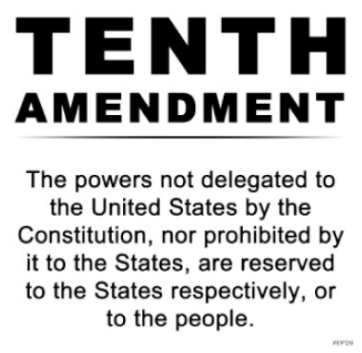
To understand the US and State Constitutions, to which I swore an Oath to protect the people against foreign and domestic enemies, I realized I had many questions and wanted to know the answers. I realized I needed to return to their time by reading the documents they wrote and debating what the Constitution’s original intent meant and how it should be conducted today. I had to return to their time by reading any documents and journals they wrote to try and understand their mindset, attitudes, purpose, and meaning.
The 10th Amendment states that “powers not delegated” to the Federal government “are reserved to the States respectively or to the people.”
I needed to understand what powers were delegated to the National/Federal government’s jurisdiction, known as the enumerated powers listed in Article 1, Section 8 of the US Constitution. The dictionary, especially Noah’s Webster’s 1828 Dictionary, became my mentor in understanding terms, concepts, and definitions.
Jurisdiction refers to the official power or authority a legal body or a governmental entity has to make legal decisions and judgments. This concept is essential in law as it determines which court or governmental agency has the right to hear a case, enforce rules, or apply legal principles in a given situation.
Understanding jurisdiction or enumerated powers within government involves grasping how authority and responsibility are distributed among various legal and governmental entities. Jurisdiction determines which entity has the power to make decisions, enforce laws, and adjudicate disputes within a specific area or concerning a particular type of issue. Here’s an in-depth look at different types of jurisdiction within government:
Types of Jurisdiction
Geographical Jurisdiction:
- Local: Cities and municipalities have jurisdiction within their geographic boundaries and handle local issues such as zoning, local law enforcement, and municipal services.
- County: Counties often manage broader regional issues like county-wide infrastructure, public health, and certain judicial functions.
- State: States have jurisdiction within their borders, covering various issues, including criminal law, education, transportation, and state taxation.
- Federal: The federal government has jurisdiction across the entire nation for issues that cross state lines or affect the country as a whole, such as immigration, interstate commerce, and national defense.
Practical Examples:
Federal vs. State Law: Federal courts handle federal laws, treaties, and the U.S. Constitution, while state courts handle cases involving state laws and state constitutional issues.
Criminal Jurisdiction: Crimes committed within a state are usually prosecuted under state law in state courts. However, crimes that violate federal law, such as mail fraud or drug trafficking, are prosecuted in federal courts.
Civil Jurisdiction: A contract dispute between businesses in different states might be heard in either state court (if both parties agree) or federal court (under diversity jurisdiction).
Importance of Jurisdiction
Understanding jurisdiction is essential because:
- It ensures that cases are heard in the correct court with appropriate authority. It helps maintain an organized and efficient legal system.
- It protects the rights of individuals by ensuring that the appropriate legal body addresses legal matters.
The rule of law aims to provide a fair and consistent application of the law by clearly defining the scope and limits of different jurisdictions.
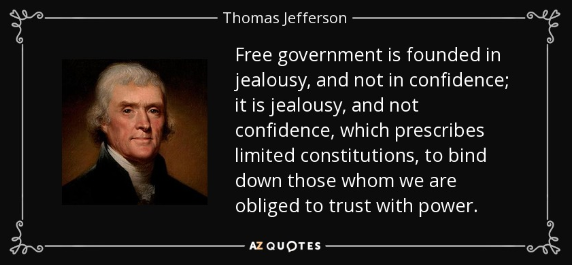
As a citizen of one of the 50 States of America, I realized that the powers not enumerated or assigned to the Federal government’s jurisdiction, the state governments have broad authority to govern within their geographical territories.
As a police officer and government agent working within Utah, specifically as a city agent, and to honor my oath to the US Constitution and Utah Constitution in defending against domestic enemies, I had to be jealous as Thomas Jefferson warned the people to be vigilant of county, state, and federal intrusion of city jurisdiction by limiting and binding down those “whom we are obliged to trust with power.”

The domestic enemy is anyone trying to infringe and remove physically, unethically, or financially through federal grants. As an agent of government, by being an employee or elected official in any of the positions or stations of the Federal, State, Country, or City government, they should be jealous of the lines and not allow them to be blurred in any way. Anyone trying to blur the lines of jurisdiction or remove the invisible boundaries known as enumerated powers in any way, intentionally or ignorantly, is a domestic enemy and hopefully can be coached and gently corrected to change their ways by reminding them that crossing the boundaries is against the US and State Constitutions.
We The People, need to be jealous and ensure that the jurisdiction, boundaries, and enumerated powers of the different levels of government are not blurred.
State Sovereignty: The 10th Amendment underscores the importance of state sovereignty and the ability of states to govern themselves in areas not covered by the enumerated powers in the US Constitution.
Balance of Power: It creates a balance of power between the federal and state governments, ensuring that the federal government does not become too powerful and encroach on areas that states should manage.
Local Control: By reserving certain powers to the states and the people, the amendment allows for local control over issues that can vary significantly from one state to another. This allows for vary significantly from one state to another. This allows for more tailored and appropriate governance.
Practical Implications
- Education: Education policy is primarily a state and local responsibility.
- Police Powers: States have the authority to regulate their citizens’ health, safety, and welfare. This includes law enforcement, public health regulations, and building codes.
- Elections: The administration of elections is largely a state function. States set their own rules for voting, including voter registration and election day procedures.
The Tenth Amendment serves as a constitutional affirmation of the federal system of government in the United States, ensuring that state governments retain a significant degree of autonomy and authority.
Unfortunately, the schooling system does not teach jurisdiction, boundaries, and enumerated powers. We are not trained to be jealous of the invisible boundaries and jurisdiction between the State and Federal government or of the autonomy of the counties and cities within the states.
We are taught the exact opposite of what Thomas Jefferson warns us not to do: to have confidence in government at all levels and our elected officials, whom we trust to represent us in our Republic.
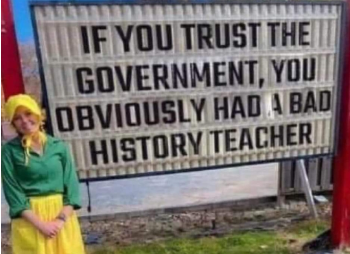
The phrase “If you trust the government, you had a bad history teacher” suggests that a thorough understanding of history reveals numerous instances of government overreach, corruption, and abuse of power. It implies that a good history education teaches skepticism and critical thinking about governmental actions and motives.
The phrase underscores the importance of holding authorities accountable and being aware of the potential for misuse of power, as evidenced by historical events. This perspective encourages vigilance and a critical stance towards government policies and actions.
“The greatest obstacle to liberty is not the existence of evil rulers, but the belief in the existence of good rulers.” — Jakub Bozydar Wisniewski
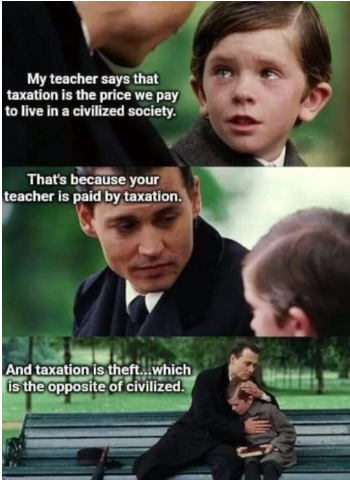
The phrase “taxation is the price we pay for a civilized society” is often attributed to U.S. Supreme Court Justice Oliver Wendell Holmes Jr. It suggests that taxes are essential for funding public goods and services, such as education, healthcare, infrastructure, and security, which collectively contribute to a functioning and civilized society.
Critics of taxation, however, argue that it is a form of coercion or theft because it involves the government taking money from individuals without explicit consent. They contend that this violates personal property rights and individual freedom, opposing the notion that such a practice is compatible with a civilized society.
“To compel a man to furnish contributions of money for the propagation of opinions which he disbelieves and abhors, is sinful and tyrannical.” — Thomas Jefferson
The debate between these perspectives hinges on differing views of government’s role and the balance between individual rights and collective responsibilities.
Proponents of taxation emphasize its necessity for the common good, while opponents stress the importance of voluntary exchange and limited government intervention.
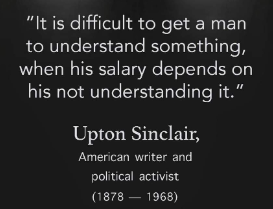
Upton Sinclair highlights the conflict of interest when an individual’s financial well-being is tied to a particular perspective or outcome. It suggests that people may consciously or unconsciously ignore, deny, or fail to understand information that threatens their livelihood when they work for any level of government and receive a paycheck tied to Federal, State, county, and city governments.
Those who work for the government at all levels might not want to rock the boat or bite the hand that feeds them by challenging policies. Supporting blurring the invisible lines might be more advantageous, as they will receive financial compensation through raises, jobs, or grants.
This concept is often used to explain why individuals in certain industries or positions might resist acknowledging facts or arguments that could jeopardize their economic stability. This leads to biased thinking and decision-making, placing people in self-deception and in the box.
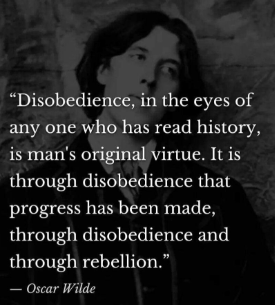
The role of disobedience and rebellion in driving societal progress. Wilde argues that questioning authority and breaking established norms are essential for innovation and advancement.
According to this perspective, many significant changes and improvements in history have occurred because individuals were willing to challenge the status quo and defy unjust or outdated practices. Thus, disobedience is seen not as a vice but a vital virtue fostering individual and societal growth and transformation.
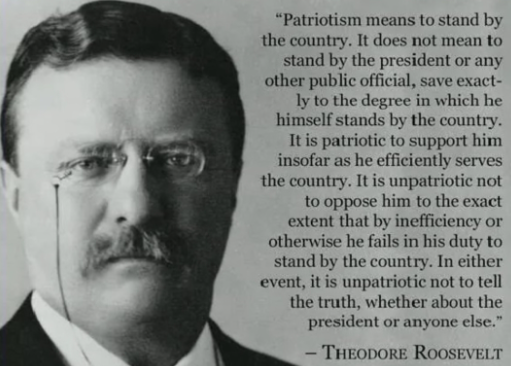
Theodore Roosevelt emphasizes that patriotism is fundamentally about loyalty to one’s country in the form of the framework of the US Consitution and State Constitutions rather than to its leaders. Roosevelt argues that supporting a president or public official is only patriotic if their actions genuinely serve the country’s best interests and keep in line and jurisdiction with the US Constitution and State Constitutions.
Conversely, it is patriotic to oppose leaders when they fail in their duties or act against the country’s overall welfare by limitations based on our country’s blueprint. It is patriotic to be for the Rule of Law and against the rule of men.
The essence of patriotism includes a commitment to truth and accountability, ensuring that leaders are held responsible for their actions. Thus, true patriotism requires both support and criticism as warranted by the leaders’ performance in serving the nation, honoring their Oath to the jurisdiction of the Constitutions, and defending the documents and people from the encroachment of the tentacles of the different governments in capturing and controlling different levels of government.
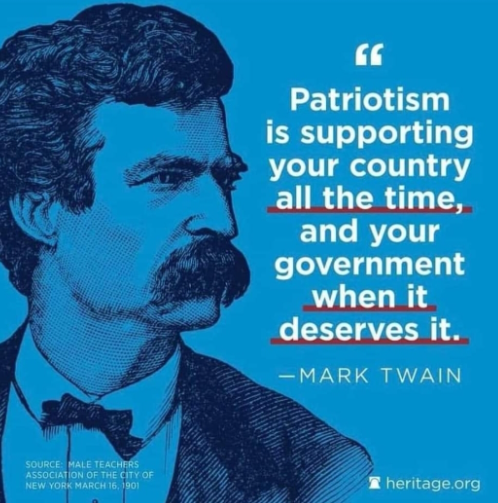
It suggests that true patriotism involves consistent love and support for one’s country but discerning and conditional support for its government at all levels and in all employment statuses. This perspective implies that while a country’s core values and people warrant unwavering loyalty, the actions and policies of its government should be critically evaluated and supported only when they align with ethical and just principles. It encourages citizens to hold their government accountable, promoting a balance between patriotism and critical thinking.
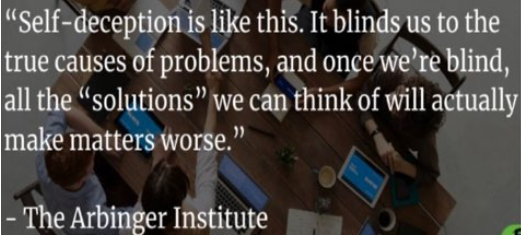
This quote from the Arbinger Institute captures the essence of self-deception and its impact on problem-solving and relationships. Here’s an analysis of the key points:
Self-Deception and Problem Perception
Blinding Effect: Self-deception distorts our perception of reality. When we are deceived about our own role in problems, our minds are clouded by hatred, selfishness, and anger. We lose not only control but also our judgment. We cannot see the true causes as deceived by emotions, feelings, biases, opinions, and preconceived ideas as we have prejudiced and distorted mindsets, interpretations, and viewpoints. Our self-deception blinds us as we betray ourselves and those we care about, and we are blinded by self-made psychological and emotional boxes.
Misidentifying Causes: Because we are blind to our contributions to issues, we incorrectly identify the causes, often attributing them to others or external factors.
Consequences of Self-Deception
Ineffective Solutions: The solutions we devise are based on a flawed understanding of the problem. Since we misidentify the causes, our solutions do not address the real issues.
Worsening the Problem: Instead of resolving the problem, our misguided efforts can exacerbate it. This creates a cycle where the problem persists or escalates, leading to frustration and conflict.
The solution to our personal and Constitutional woes we are going through in this dark period of history is overcoming deception from all levels of life. Whether it is self, government, schooling, media, financial, or corporate deception, we need to become aware of it happening and then return to original meanings to get our country and families back on course.
Overcoming Self-Deception
Awareness: The first step in overcoming self-deception is becoming aware of our own biases and how they influence our perceptions and actions.
Empathy and Understanding: By recognizing others as individuals with their own perspectives and needs, we can better understand the true nature of problems and work towards effective solutions.
Practical Implications
Leadership: Leaders who acknowledge their own biases can create more harmonious and productive work environments.
Conflict Resolution: In personal and professional relationships, overcoming self-deception helps address conflicts more constructively and empathetically.
In summary, self-deception and ignorance hinder our ability to correctly identify and solve problems, often leading to solutions that worsen the situation. By becoming aware of and addressing our own biases, we can better understand and resolve issues in our relationships and government by following Jefferson’s warnings of being jealous of the different levels of government to protect and defend our constitutions, freedoms, and liberties by distrusting government and by being patriotic by true patriotism requiring both support and criticism as warranted by the leaders’ performance in serving the nation, honoring their Oath to the jurisdiction of the Constitutions, and defending the documents and people from the encroachment of the tentacles of the different governments, corporations, or group of men in capturing and controlling different levels and limited enumerated powers of the different government in our Federated Republic and in essence our freedoms and day to day lives as individuals and our families.
“A nation of well-informed men who have been taught to know and prize the rights which God has given them cannot be enslaved. It is in the region of ignorance that tyranny begins.” — Benjamin Franklin

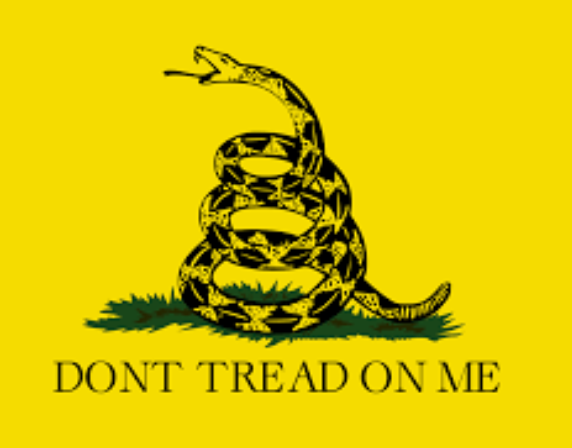



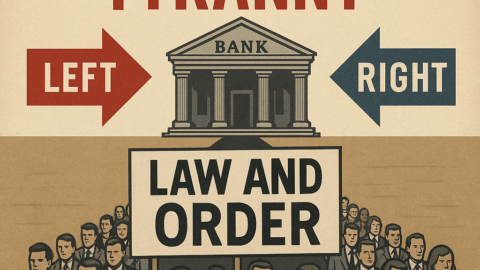

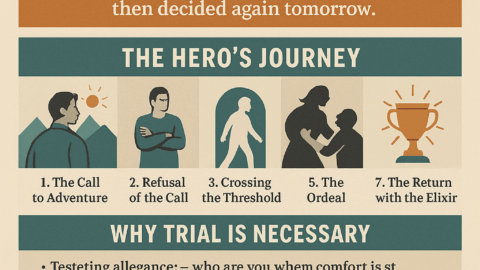
One Response
The next iteration of this line of thinking ~~should~~ **needs** to be that we not only distrust government but all forms of centralized power. At least those that cannot be trued up via a moonlight hike with like-minded friends. Centralized power, even if it was assembled with good intention, always attracts the sociopaths and eventually the psychopaths. And that is where we find ourselves now.